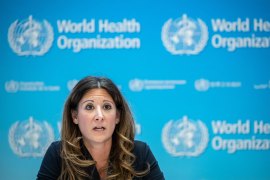UNFPA Calls for Increased HIV/AIDS Prevention, Family Planning in Light of World Population Projection for 2050
The United Nations Population Fund has called for an increased focus on family planning programs and HIV/AIDS prevention in developing nations in light of a U.N. Population Division report released Thursday projecting that the world's population will increase by 40% by 2050, the AP/Albany Times Union reports (Lederer, AP/Albany Times Union, 2/25). The world population in 2050 is expected to be 9.1 billion, compared with 6.5 billion currently, according to the report. Although the population of developed countries is expected to remain "almost static" at 1.2 billion between now and 2050, the report estimates that the populations of the world's 50 most resource-poor countries will more than double by 2050, according to BBC News.
Decline in Population Growth Rate
Despite the projected population increase, the growth rate of the world population has declined over the past 20 to 50 years, in large part because of increased access to family planning and lower fertility rates, according to report author Thomas Buettner. The total fertility rate is expected to decline from 2.6 children per woman today to slightly more than two children per woman by 2050, according to the report (BBC News, 2/25). In addition, the average life expectancy of a person born in 2050 will be 75 years, whereas people born in 2004 have a life expectancy of 65 years, the report says (Wald, CNN.com, 2/24). However, life expectancy in Africa has declined from 62 years in 1995 to 48 years in 2000-2005, according to the report. The report attributes the decline in life expectancy to the spread of HIV and other infectious diseases, poverty and armed conflict (BBC News, 2/25).
Reaction
Hania Zlotnik, director of the U.N. Population Division, said the report's predictions are based on the assumption that the HIV/AIDS pandemic will be controlled, CNN.com reports. "We cannot emphasize enough the huge impact of this disease," Zlotnik said, adding, "We also have to emphasize that these projections in the long term are assuming that humanity is going to have success in combating the spread of this disease, by mostly behavioral change and prevention" (CNN.com, 2/24). "Developing countries suffer most of the world's deaths from AIDS and lose most of the half million women who die each year from childbirth-related causes," UNFPA Executive Director Thoraya Ahmed Obaid said, adding, "We must take more urgent action to promote access to reproductive health, including family planning, and fight HIV/AIDS to save millions of lives from AIDS and maternal death, as well as to reduce poverty in developing countries" (UNFPA release, 2/24).






